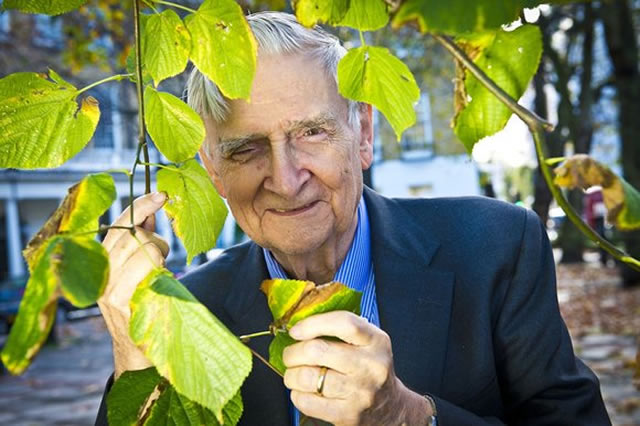The insect expert and ‘natural heir to Darwin’ is supporting a monument in Dorset to extinct species. If we don’t act now, he warns, to save others, we too may be queuing up to be remembered.
By Josh Glancy. Published in The Sunday Times, November 9, 2014.


Forget climate change, killer robots and terrorism. What really threatens the future of humanity is dying ants. Or, more generally, the mass extinction of species. To save the planet, we need to save the creatures that live on it, otherwise the delicate balance of life on Earth will fall apart.
Coming from a shrill eco-activist this might sound alarmist, but this is EO Wilson speaking. Perhaps the greatest living biologist, the 85-year-old is known as “the heir to Darwin” for his studies on insect life and work on evolutionary theory. When Wilson talks, you listen.
“We are tearing down the biosphere,” he says. “Without abatement, the current rate of human activity will result in as many as half the species of plants and animals being extinct or on the brink of extinction by the end of the century. I don’t think the world can sustain this. It really will be for ever.”
He argues that we know about only 2m of the 8m-10m species that live on our planet. Species that we have not even discovered might be becoming extinct with consequences for the planet, its ecosystems and ourselves that we simply cannot fathom.
His careful thoughts are delivered with an assured Harvard drawl and just the slightest southern inflection, a relic of his childhood in Mobile, Alabama. A distinctive silver quiff frames his craggy face, marked by bushy eyebrows and a slanted right eye, damaged to the point of blindness in a fishing accident when he was eight.
I meet Wilson for coffee at his hotel in London, from where he is embarking on a week-long tour of “the mother country” to promote his new book, modestly titled The Meaning of Human Existence. But there is another, more intriguing reason for his visit. His charitable foundation is lending its support to a new project, the Mass Extinction Monitoring Observatory, or Memo.
It is an audacious undertaking, Stonehenge meets the Eden Project. By the end of 2016, if all goes to plan, a 100ft circular ziggurat will perch on the rugged cliffs of the Isle of Portland in Dorset. Built of local stone taken from the Jurassic coastline, Memo will be a monument to all the species that have been registered as extinct since the dodo (last sighted in 1662). Each of the 860 species will be carved into the interior walls by sculptors from around the world. These include the passenger pigeon, whose last representative, Martha, died in Cincinnati Zoo almost exactly 100 years ago. Also there will be the great auk, which used to nest in the cliffs of Portland, the Tasmanian tiger and the Yangtze dolphin, which was declared extinct only in 2006.
It will be, in Wilson’s words, a “Magna Carta for biodiversity”, a new charter for a world in which humans accept that they are one species among many. That we were not just “plonked down from above” to take charge and use the planet for our purposes. In the roof of the building will be a large bell, to be rung as a sombre warning each time another species becomes extinct.
“What the Memo initiative does is to, in a secular sense, sacralise species and make them part of our foundation for including species, every species, within our own spiritual self-regard.”
All species, no exceptions? “Well, I suppose we can make an exception of the ebola virus.”
Wilson really cares about this stuff. This is his religion and he tells it like a wise old preacher. While gesticulating passionately about as-yet undiscovered microbes, he spills hot coffee down his trousers. It does not come as a surprise: “I knew that would happen if I made that point.”
Among the Memo project’s patrons are the grand dukes of public science and nature in this country: James Lovelock and Sir David Attenborough. But Memo’s intellectual lodestar is Wilson, and it was he who broke ground on the project last Monday, rousing his stooped octogenarian frame to plant symbolically a shovel into the Dorset soil. Along with his books and his impossibly detailed work on ants, this will be Wilson’s legacy.
After a career spanning more than 50 years, one wonders how Wilson keeps going. He traces his passion for insects to his partial blinding. “From childhood I could see tiny things very well and did better with them than more distant things,” he says. “I turned to insects, and by the time I was nine I had decided I was going to be an entomologist.”
Wilson’s systematic study of ants is unparalleled. But it was when he “naively” expanded his ideas to humans that trouble began. In the 1970s he pioneered a new field, sociobiology, which argued that there was a strong genetic basis for human behaviour. Nature over nurture. This led to criticism from scientists and also the far left, who claimed his ideas amounted to eugenics.
Now Wilson lives in a retirement community in Massachusetts with his “very understanding” wife Irene; his daughter Catherine lives nearby. Age has not withered his mind: next year he has another book coming out called The End of the Anthropocene, which will outline just how man can bring to an end this period of destructive dominance. Wilson will go on until his body forces him to stop. He attributes his success to “longevity and energy and dedication to an idea and just plain luck”. That luck may be starting to run out, though: “I’ve developed the first serious sign of old age: I have bad knees. But I’m doing very well in health in every other respect.”
He has not lost his taste for controversy either. I ask him if he will look in on fellow Darwin enthusiast Richard Dawkins during his visit (the pair had a public falling out two years ago when Dawkins lambasted Wilson’s previous book, which contentiously explained evolution through group selection, rather than Dawkins’s preferred theory of kin selection).
“He [Dawkins] had a virtually allergic reaction when a group of mathematicians, other biologists and I began dismissing the theory of kin selection. Well, he’s a fine journalist. But he’s not a naturalist and he’s not a scientist. This whole debate, in the eyes of the public, between me and Dawkins is ridiculous. There’s no disagreement between me and Dawkins because Dawkins is not in the arena. He’s not qualified for this debate; this is a debate amongst scientists.” Ouch.
Having started off by studying tiny insects, Wilson is now trying to grapple with some of the biggest human questions. In his latest book he tries to establish where humanity has gone wrong in its treatment of the planet.
One culprit is religion, in whose “fever swamps” we have become mired, giving us an overinflated sense of entitlement, he argues. Another is that we are a “young and very dysfunctional species”. He summarises our dysfunction: “We have paleolithic emotions, we haven’t changed any of those… that’s what we call human nature. We have medieval institutions, and we have God-like power. That is a very dangerous mix.”
Can we save ourselves? Not through technology alone. He thinks that the idea we can use our technology to replace billions of years of evolution is “foolish”. Instead we need to “build a better ethic”, one that recognises the importance of other species. Wilson warns that the stakes could not be higher. “Save the biosphere and you have the capacity to save the world. Don’t save the biosphere and we’re dooming ourselves.”

